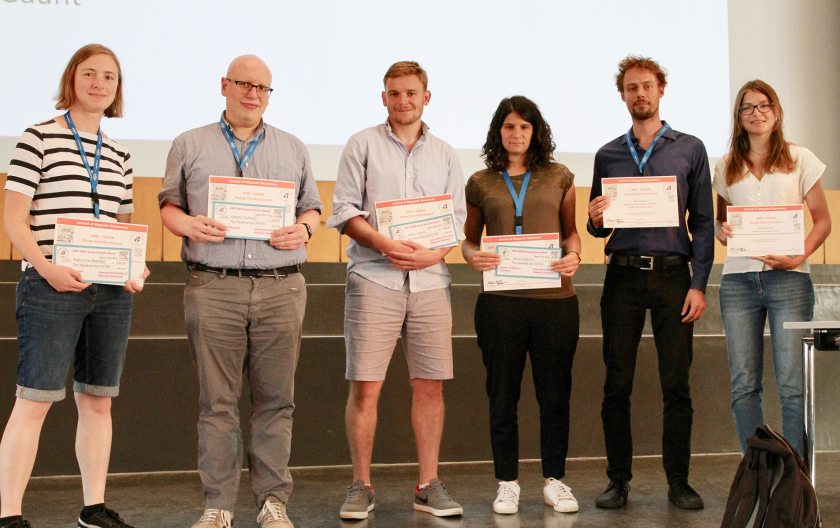HZB doctoral student won Young Scientist Award

Silvio Künstner (2nd from right) was awarded with five other young researchers at the EUROISMAR 2019 conference. © EUROISMAR 2019
The "Journal of Magnetic Resonance" and the ISMAR (International Society of Magnetic Resonance) awarded Silvio Künstner with a Young Scientist Award for his talk "Rapid Scan EPR-on-a-chip". The doctoral student from the HZB institute for Nanospectroscopy presented current progress in the development of a miniaturized electron spin resonance spectrometer.
Electron spin resonance or electron paramagnetic resonance (EPR) provides detailed information about the inner structure of materials, down to an atomic level. This understanding of the material is essential for research in the field of renewable energies, such as efficient solar cells or battery electrodes. Of particular importance are experiments under real process conditions (operando measurements).
The chip-sized miniaturized EPR spectrometer presented by Silvio Künstner is so small that it can be inserted directly inside the sample. This improvement simplifies the handling of operando measurements significantly. In addition, EPR-on-a-chip is far more sensitive than conventional instruments. Next to the Helmholtz Zentrum Berlin, the University of Stuttgart, the Max Planck Institute for Chemical Energy Conversion, as well as the Karlsruhe Institute of Technology (KIT) and Bruker (as part of the BMBF's "EPRoC" project) are involved in the research of the miniature spectrometer.
Silvio Künstner received the Young Scientist Award at the ISMAR EUROMAR Joint Conference (25 - 30 August 2019) in Berlin, which was attended by more than 1000 scientists. At the world's largest conference in this field, the HZB was involved as co-organizer. Furthermore, researchers of the Helmholtz-Zentrum Berlin participated with more than ten presentations.
(sf/sk)
https://www.helmholtz-berlin.de/pubbin/news_seite?nid=20764;sprache=en
- Copy link
-
Catalysis research with the X-ray microscope at BESSY II
Contrary to what we learned at school, some catalysts do change during the reaction: for example, certain electrocatalysts can change their structure and composition during the reaction when an electric field is applied. The X-ray microscope TXM at BESSY II in Berlin is a unique tool for studying such changes in detail. The results help to develop innovative catalysts for a wide range of applications. One example was recently published in Nature Materials. It involved the synthesis of ammonia from waste nitrates.
-
Samira Aden joins ETIP PV - The European Technology & Innovation Platform for Photovoltaics ESG Working Group
Samira Jama Aden, Architect Design Research, has joined the ETIP PV - The European Technology & Innovation Platform for Photovoltaics working group “Environmental, Social and Governance (ESG)”.
-
BESSY II: Magnetic ‘microflowers’ enhance magnetic fields locally
A flower-shaped structure only a few micrometres in size made of a nickel-iron alloy can concentrate and locally enhance magnetic fields. The size of the effect can be controlled by varying the geometry and number of 'petals'. This magnetic metamaterial developed by Dr Anna Palau's group at the Institut de Ciencia de Materials de Barcelona (ICMAB) in collaboration with her partners of the CHIST-ERA MetaMagIC project, has now been studied at BESSY II in collaboration with Dr Sergio Valencia. Such a device can be used to increase the sensitivity of magnetic sensors, to reduce the energy required for creating local magnetic fields, but also, at the PEEM experimental station, to study samples under much higher magnetic fields than currently possible.
